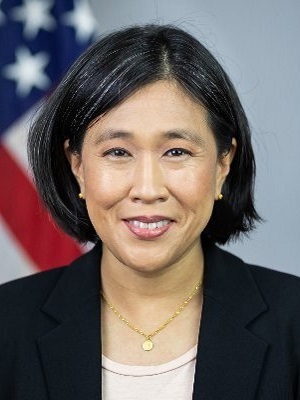The China portion of this year's trade policy report issued March 1 says President Joe Biden's administration will rely on its Build Back Better agenda to deal with China's "unfair" practices.
The Biden administration believes the Build Back Better agenda addresses China with a lead-by-example way of participating in the global economy, U.S. Trade Representative Katherine C. Tai said in a news release.

U.S. Trade Representative Katherine C. Tai
| twitter.com/ambassadortai
"President Biden believes that America is at its best when we are leading on the world stage to deliver economic prosperity and growth to our citizens and communities," Tai said in a March 1 news release. "The 2022 Trade Policy Agenda and 2021 Annual Report provide a detailed look at some of the key accomplishments in the first year of the Biden Administration, and how we intend to build on this progress."
Tai released the 312-page 2022 President's Trade Policy Agenda and 2021 Annual Report to Congress March 1. The agenda and report are given to Congress each year as required by the Trade Act of 1974. The agenda and report details a range of Biden Administration trade policies with sections on a number of countries, including China. The report calls China's economic and trade practices "unfair" and points to the Build Back Better legislation as a way to "realign" the US-China trade relationship through domestic investments.
The agenda refers to China as a large, "non-market" economy. The agenda released by Tai refers to China's long established habits of "countervailing and antidumping duties," particularly on U.S. exports to China. The agenda refers to Chinas as "uniquely able to distort the marketplace through unfair, anticompetitive practices, which harm workers and businesses in the United States and in other countries, including some of our closest allies and partners.
"By unduly concentrating production of certain goods in China, these non-market policies and practices also undermine supply chain resilience and harm consumers that, in the long run, are deprived of the innovation and choice that fair competition would produce," the agenda continues.
China employs a "wide array of unfair, distortive measures that provide substantial support to Chinese industries," limits market access for imported goods and service and restricts access to its markets by foreign companies, the report says.
"Further, it has used various, often illicit, means to secure foreign intellectual property and technology to pursue its industrial policy objectives," the agenda says. "China fails to provide its people with the most basic of labor rights, including the right to organize and bargain collectively. Low operating costs resulting from artificially low wages and poor worker protections remain some of the key reasons why companies have chosen to offshore production there."
China is also reportedly notorious for using state-sponsored forced labor, which the agenda referred to a "an affront to human dignity."
The agenda notes that what the U.S. sees as challenges is also attractive to companies willing to do business in China because labor costs are kept low and lax environmental policies mean no need to abide by much regulation. That attraction not withstanding, the agenda referred to "groundbreaking domestic investments" in the Biden Administration's Build Back Better agenda "which allow the United States to engage and compete with China from a position of strength."
Biden's $2.2 trillion Build Back Better agenda, with its wide range of spending in areas such as education, health care and climate programs, passed the U.S. House of Representatives in November, but stalled in the Senate, many news outlets, including The Hill, reported at the time.
U.S. Senate Republican Leader Mitch McConnell (R-Ky) lead GOP opposition to the Build Back Better agenda, warning the huge spending package would help, rather than harm, China's economy.
"The Biden administration doesn’t have any strategic plan to snap its fingers and turn our massive country into some green utopia overnight," McConnell said on the Senate floor in November 2021. “They just want to throw boatloads of government money at things like solar panels and electric vehicles and hope it all works out."
That strategy will not work with China, which "absolutely dominates these supply chains" for solar and electronic vehicle production, McConnell added.
"For lithium batteries. For solar panels," he said. "For practically all these fashionable purchases into which Democrats want to dump all this money. In all likelihood, Democrats’ supposedly 'green' agenda would just provide a massive one-way gift to our adversary, the world's number-one emitter, the Chinese Communist Party. This isn't 'Build Back Better.' It's 'Build Back Beijing!'"
This year's agenda and report section on China also have met with skepticism. About two weeks after the agenda's release, China Briefing said Biden has "a chance to change the course of US-China relations" following "a low point" under former President Donald Trump but that details are lacking.
"The [2022 Trade Policy Agenda] report did not provide specific details on policy measures for trade with China but stated that the U.S. would renew engagement with partners and allies 'to address shared challenges' with regard to China," China-Briefing said. "The report strongly suggests the U.S. will continue to implement policies to increase its competitiveness with China and use its influence on the international stage to urge other countries to do the same."
Before the report and agenda were released, national security officials were calling for the Biden to issue an executive order to ban U.S. companies from investing in Chinese technology firms and startups. Such an executive order would "ensure U.S. banks aren’t helping Chinese firms develop software or devices later used by the People's Liberation Army," Politico reported in a March 7 news story.
Those calls have been met with push back from the U.S. Treasury and Commerce departments, which are "arguing that new rules would dramatically reduce new U.S. business in China and put American firms at a competitive disadvantage to European and Asian banks that will continue to access the world’s second largest economy," Politico said.




